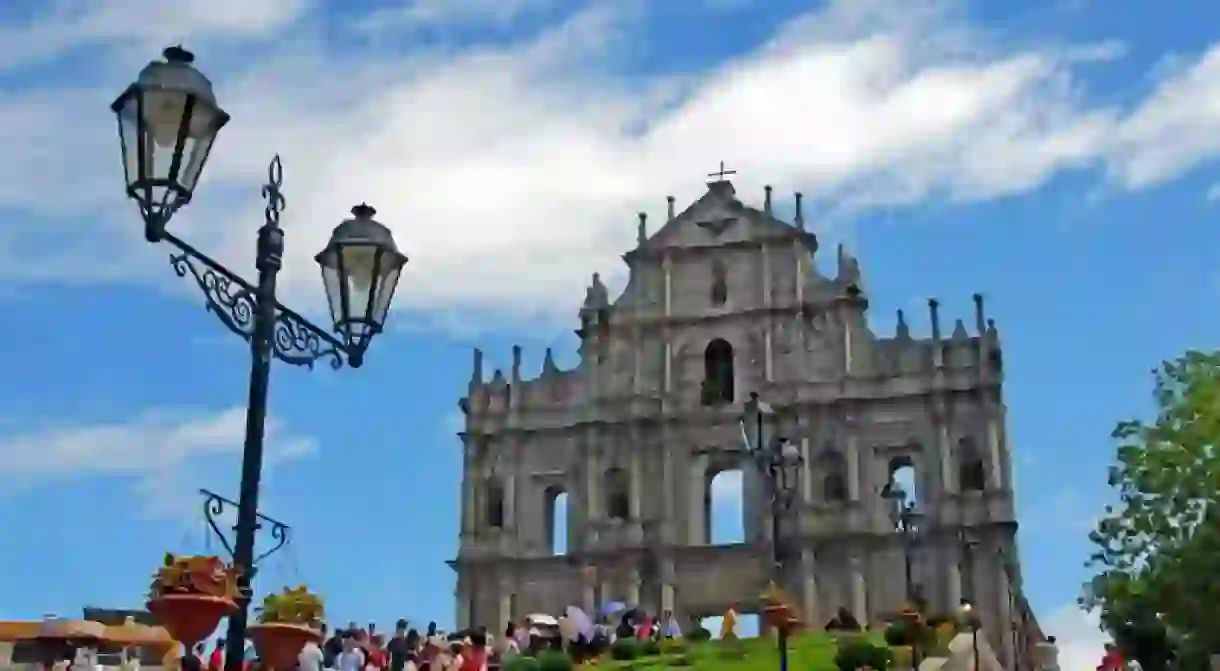10 Moments in History That Shaped Macau

No other city in the world has Macau’s unique mix of Chinese and Portuguese cultural influences. Macau was Europe’s first and last colony in Asia and has a rich history unlike any other. Here are 10 defining moments that have shaped this one-of-a-kind city.
Arrival of the Portuguese
Some 500 years ago, Jorge Alvarez, a Portuguese explorer, landed in southern China. Back then, Macau was a mere fishing village and not viewed as a prime location or a place of great value by the Chinese. However, the Portuguese saw its potential and in 1557 it became the first port in the Far East to be settled in by westerners.
Home of Christianity in China
The Portuguese settlers played a major role in bringing Christianity to China. By 1576, the Catholic Church made Macau a diocese. Following this, in 1594, St. Paul’s College of Macau was founded by Jesuits to train missionaries in the language and culture of the Chinese. The Church of St. Paul was also built on the site. However, both buildings were destroyed by a fire in 1835, leaving only the beautiful granite façade of the old church. Today the facade still stands as the most famous landmark in Macau – Ruins of St. Paul’s. For a period of time, the structure was the largest church in Asia and acclaimed as “The Vatican of the Far East.”

Dutch invasion
For the first few decades after the Portuguese settled in Macau, they enjoyed great economic prosperity with Macau as the sole gateway for the West to trade with the East. However, on July 24, 1622, the Dutch assaulted the city. Ultimately, their attempt to overthrow the Portuguese failed. Despite this, following the Dutch assault, increased interest from traders led to the opening of other ports on China’s east coast which began to decrease Macau’s importance.
The emergence of Hong Kong
In 1841, neighbouring Hong Kong Island was ceded from China to the British. Hong Kong, under British rule, soon swelled into the top financial hub in southern China, surpassing Macau. This was a great blow to Macau and the city’s economy nearly collapsed.

Gambling is legalised
In an attempt to recover the economy in light of the competition from Hong Kong, in 1844 the Portuguese decided to legalise gambling in Macau. Economically, this has been a lifesaver for Macau. As of 2006, Macau overtook Las Vegas to become the most successful gambling hub in the world. Today, Macau remains the only city in China where gambling is legal.
Firecracker industry
Before Macau’s casino boom emerged in the 1970s, the backbone industry of the ’50s and ’60s was the city’s labour-intensive firecracker-making trade. For a large part of the 20th-century, Macau was the world’s largest exporter of firecrackers. At its height, Macau boasted seven firecracker factories, and they became the top source of local employment.

Handover back to China
On December 20, 1999, Macau returned to Chinese sovereignty after almost 450 years as a Portuguese colony. It was the last European colony in China to be handed back after Hong Kong before it, in 1997. As part of the handover deal, China agreed to implement a “One Country, Two Systems” policy, which stated that for 50 years, Macau citizens could retain a capitalist economy and some political freedoms.
Opening of largest casino resort in the world
On August 28, 2007, the world’s largest casino opened in Macau – The Venetian Macao. This coincided with the opening of the Cotai Strip (Macau’s equivalent of the Vegas Strip). The 39-storey building, which boasts 3,000 suites, cost US$2.4 billion to build. The casino space inside the Venetian resort measures upwards of 34,000 square metres. In 2017, The Venetian Macao celebrated its 10th anniversary. The resort still welcomes 75,000 visitors a day and has played the biggest part in transforming Macau into the most successful gambling city in the world.

Richest territory on earth
Since 2012, Macau has appeared in the top five ranking of the world’s richest territories. In 2014, Macau was ranked the top city in the world for economic performance. Bolstering its reputation for being extremely rich from casino taxes, the government even pays its 600,000+ population an annual dividend.
20th anniversary of handover back to China
December 2019 will mark 20 years since Macau was handed back to China. In the two decades since Macau returned to Chinese rule, the city has swelled into the world’s most successful gaming capital. Macau’s population is now estimated to be 95% Chinese and the tiny city welcomes over 30 million visitors every year.













